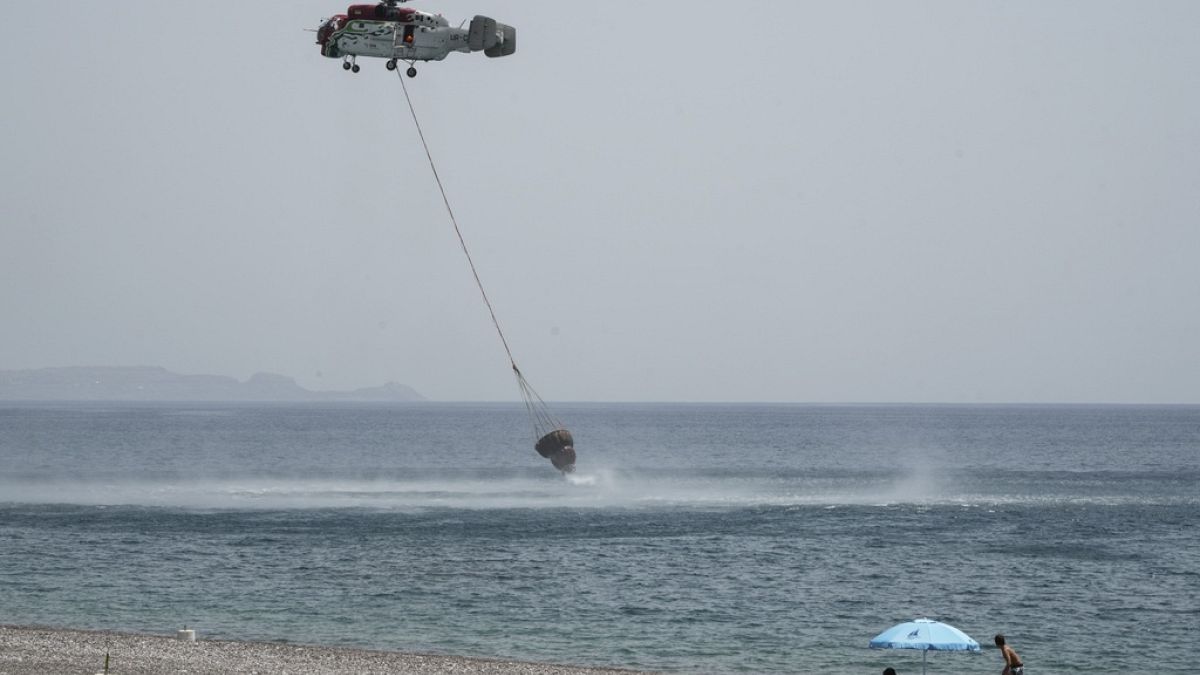A drop in temperatures and calmer winds helped firefighters get a handle on the blazes in Greece and all major fires were contained by midday Friday, Greek Fire Service officials said.
A drop in temperatures and calmer winds helped firefighters get a handle on the blazes in Greece and all major fires were contained by midday Friday, Greek Fire Service officials said.
During the last 10 days, 667 wildfires have erupted across the country, including 10 major ones. Most of those are now under control. "Never before have we had a map on alert for so many days in a row, in so many regions," said Vassilis Kikilias, the Greek minister for climate change and civil protection.
Kikilias said fires had burned 400 square kilometres of land in the country in July alone, while the recent average is 500 square kilometres in a year.
“Is the situation any better in other countries bordering the Mediterranean? It’s a fair question ... but the answer is no,” Kikilias said.
“The climate crisis that brought us this unprecedented heat wave is here. It’s not a theory. It is our actual experience,” he said. “This is not something that will just occur this year. It will last and we have to face the consequences of what that means.”
As the situation improved considerably, Greece's minister for the police unexpectedly stepped down, citing “personal grounds.” Greek media said Notis Mitarachi's resignation was requested after it emerged he had been on a family holiday during the wildfire crisis.
The main opposition Syriza party issued a statement accusing the centre-right government of using “personal grounds” as a euphemism for “(Mitarachi's) holidays while the country was burning from end to end.”
Ammunition depot blast
In central Greece, authorities maintained an exclusion zone around one of the country's largest air force bases after a wildfire triggered powerful explosions at a nearby ammunition depot Thursday. Fighter jets stationed at the 111th Combat Wing base were moved to other facilities.
The depot blasts near the central city of Volos shattered windows in nearby towns and prompted the evacuation of more than 2,000 people. Local news broadcasts showed a ground-shaking fireball erupting.
Residents were rushed onto private boats mobilized by the coast guard and taken to a conference centre in Volos, some 20 kilometres from the weapons storage site. A civilian traffic ban and evacuation order remained in effect Friday within a 3-kilometre radius of the depot.
The explosions did not affect flights at Volos international airport, officials told The Associated Press.
Cooler temperatures
Conditions also improved elsewhere in Europe's Mediterranean regions thanks to cooler temperatures, allowing firefighters to contain wildfires along the Croatian coast and in Sicily.
Firefighting teams in Turkey also brought a wildfire burning close to the southern Mediterranean resort of Kemer under control, four days after it erupted, Ibrahim Yumakli, the country’s forestry minister, said.
The governments of the countries hit by heat waves and fires have steered public debate away from the potential impact on tourism. Rhodes, where a fire last weekend required about 19,000 people to be evacuated from several locations on the island, was promised state support Friday for its international advertising campaign.
In Germany, Health Minister Karl Lauterbach sought Friday to address Italian irritation over a mid-July social media post in which he described the heat wave he encountered on a visit to Italy as “spectacular” and added that “if it goes on like this, these vacation destinations will have no future in the long term.”
Lauterbach told reporters in Berlin that he wasn’t warning against vacations in southern Europe and plans to visit Italy again himself.
“Of course, it is more difficult now for the southern countries to organize heat protection in such a way that it is also accessible for every tourist, but I think those countries will know exactly what they have to do,” he said.
Displaced at risk in Syria
Meanwhile, in Syria heatwaves are putting displaced people at risk, the United Nations has warned, as temperatures in the country jumped from 30 to 46 degrees Celsius.
Stéphane Dujarric, the spokesperson for the UN Secretary-General, said 800 000 people living in camps are in immediate danger. “A plan, launched by ourselves and our partners, to move displaced people in northwest Syria out of tents and into dignified shelters is being implemented.”, Dujarric said.
According to the UN, at least 134 fires were reported across northwest Syria in July. Some 1.9 million displaced people live in some 1,400 camps or self-settled sites in the region, the majority of whom are women and children.
